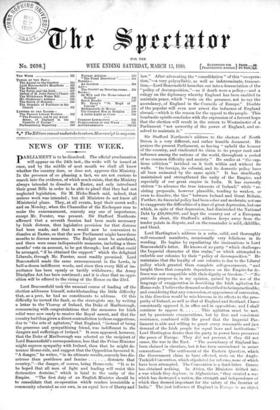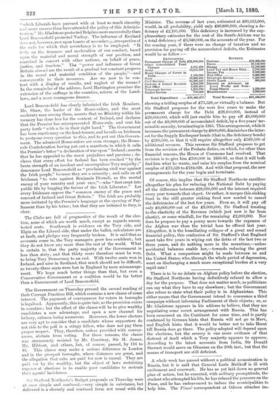Lord Hartington's address is a calm, solid, and thoroughly well-reasoned
manifesto, occasionally very felicitous in its wording. He begins by repudiating the insinuations in Lord Beaconsfield's letter. He knows of no party " which challenges the Imperial character of this realm," or which attempted to enfeeble our colonies by their " policy of decomposition." He maintains that the loyalty of our colonies is due to the Liberal policy which granted them complete self-government, " and taught them that complete dependence on the Empire for de- fence was not compatible with their dignity or freedom :"—" No patriotic purpose is, in my opinion, gained by the use of the language of exaggeration in describing the Irish agitation for ry Home-rule. I believe the demand so described to be impracticable; and considering that any con cession, or appearance of concession, in this direction would be mischievous in its effects to the pros- perity of Ireland, as well as that of England and Scotland, I have consistently opposed it, in office and in opposition; and I shall continue to oppose it This agitation must be met, not by passionate exaggerations, but by firm and consistent resistance, combined with the proof that the Imperial Par- liament is able and willing to grant every reasonable and just demand of the Irish people for equal laws and institutions." Lord Hartington denies that the party in power have preserved the peace of Europe. They did not prevent, if they did not cause, the war in the East. " The ascendancy of England has been claimed in circulars, but it has been surrendered in secret conventions." The settlement of the Eastern Question, which the Government claim to have effected, rests on the Anglo- Turkisli Convention, which stipulated for reforms, none of which have been attempted. The Convention is a dead-letter. Greece has obtained nothing. In Africa, the Ministers drifted into a war which they deplore ; in Afghanistan, " they created a war which has destroyed a nation, the strength and independence of which they deemed important for the safety of the frontier of India." The just influence of England in Europe is an object
" which Liberals have pursued with at least as much sincerity awl more success than have attended the policy of this Adminis- tration." Mr. Gladstone protected Belgium more successfully than Lord Beaconsfield protected Turkey. The influence of England does not, however, rest upon boasts of ascendancy, irrespective of the ends for which that ascendancy is to be employed. " It iTits on the firmness and moderation of our conduct, based upon the material and moral strength of our position, and exercised in concert with other nations, on behalf of peace, justice, and freedom." The "power and influence of Great Britain abroad are the result of a gradual but constant progress in the moral and material condition of the people,"—and consequently in their resources. Are we now to be con- tent with a display of results, and neglect of the means ? In the remainder of the address, Lord Hartington promises the extension of the suffrage in the counties, reform of the Land- laws, and a more courageous finance.



































